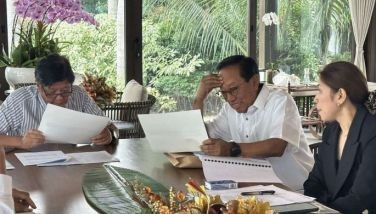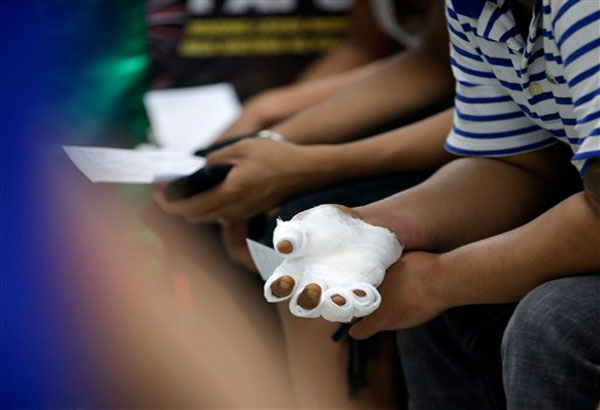11 Indians’ case: Ex-BI chief gets 12 years
October 24, 2006 | 12:00am
The Sandiganbayan has sentenced a former immigration commissioner to six to 12 years in jail for allowing 11 Indians facing drug charges to return home instead of being prosecuted in 1994.
In a 67-page decision penned by Associate Justice Teresita Diaz-Baldoz and handed down last Oct. 13, the Sandiganbayan’s fifth division found former Bureau of Immigration (BI) commissioner Zafiro Respicio guilty of the charge of falsification of public documents.
The Sandiganbayan also perpetually disqualified Respicio from holding public office and ordered him to pay a fine of P5,000.
According to court records, 11 Indian nationals were apprehended by agents of the National Bureau of Investigation (NBI) Domestic Intelligence Service during a raid on a drug laboratory in Las Piñas on July 4, 1994.
The arrested Indians were then charged with violating Republic Act 6425 or the Dangerous Drugs Act of 1972. They were identified as Pramod Jogdeo, Shaik Easaf, Sunkavalivenkata Lakshimanaraya, Augustine Rajesh, Nagayya Vanam, Mohammad Rafique, Kausar Ali, Nabi Gulam, Mengesh Jadhav, Laxman Kadam, and Cajetan Merwyn Mujares.
A month later, they filed individual requests for self-deportation with the BI, which Respicio and associate commissioners Bayani Subido Jr. and Manuel Rojas approved despite an ongoing preliminary investigation against them.
Drug trafficking is a non-bailable crime in the Philippines and carries the death penalty.
According to the Office of the Ombudsman, the requests for deportation were signed during Respicio’s birthday party.
The Sandiganbayan acquitted Subido and Rojas of the same charges filed against Respicio, ruling that "no conspiracy existed among the accused" and that the prosecution failed to prove the guilt of these two officials beyond reasonable doubt.
The anti-graft court also cleared another of Respicio’s co-accused, former NBI deputy director Arturo Figueras, after he died while the case was still being heard. He was also the chief of the bureau’s Domestic Intelligence Service.
The Sandiganbayan noted that although Subido and Rojas also signed the questioned self-deportation order, it said the two officials did not participate in the drafting of the false document and that Respicio himself later admitted that he never informed them about the preliminary investigation.
It is unclear how Respicio allegedly benefited from his ruling and if the government paid for the Indians’ deportation.
The court also ruled that the 11 Indians "had indeed derived unwarranted benefit, advantage or preference from the issuance of Self-Deportation Order No. 94-685 because their deportation, which did not have any basis, barred their further prosecution in court for violation of the Dangerous Drugs Act."
"The records disclose that in Criminal Case No. 94-5273 subsequently filed against them with the regional trial court of Las Piñas on the ground of their deportation, and a hearing thereon was set three months after their departure from the country," the Sandiganbayan said.
Special Prosecutor Dennis Villa-Ignacio hailed the anti-graft court’s decision.
"This decision should serve as a warning to government officials against the commission of graft, as the long arm of the law will eventually catch up with them even after their separation from the service," he said. — With AFP
In a 67-page decision penned by Associate Justice Teresita Diaz-Baldoz and handed down last Oct. 13, the Sandiganbayan’s fifth division found former Bureau of Immigration (BI) commissioner Zafiro Respicio guilty of the charge of falsification of public documents.
The Sandiganbayan also perpetually disqualified Respicio from holding public office and ordered him to pay a fine of P5,000.
According to court records, 11 Indian nationals were apprehended by agents of the National Bureau of Investigation (NBI) Domestic Intelligence Service during a raid on a drug laboratory in Las Piñas on July 4, 1994.
The arrested Indians were then charged with violating Republic Act 6425 or the Dangerous Drugs Act of 1972. They were identified as Pramod Jogdeo, Shaik Easaf, Sunkavalivenkata Lakshimanaraya, Augustine Rajesh, Nagayya Vanam, Mohammad Rafique, Kausar Ali, Nabi Gulam, Mengesh Jadhav, Laxman Kadam, and Cajetan Merwyn Mujares.
A month later, they filed individual requests for self-deportation with the BI, which Respicio and associate commissioners Bayani Subido Jr. and Manuel Rojas approved despite an ongoing preliminary investigation against them.
Drug trafficking is a non-bailable crime in the Philippines and carries the death penalty.
According to the Office of the Ombudsman, the requests for deportation were signed during Respicio’s birthday party.
The Sandiganbayan acquitted Subido and Rojas of the same charges filed against Respicio, ruling that "no conspiracy existed among the accused" and that the prosecution failed to prove the guilt of these two officials beyond reasonable doubt.
The anti-graft court also cleared another of Respicio’s co-accused, former NBI deputy director Arturo Figueras, after he died while the case was still being heard. He was also the chief of the bureau’s Domestic Intelligence Service.
The Sandiganbayan noted that although Subido and Rojas also signed the questioned self-deportation order, it said the two officials did not participate in the drafting of the false document and that Respicio himself later admitted that he never informed them about the preliminary investigation.
It is unclear how Respicio allegedly benefited from his ruling and if the government paid for the Indians’ deportation.
The court also ruled that the 11 Indians "had indeed derived unwarranted benefit, advantage or preference from the issuance of Self-Deportation Order No. 94-685 because their deportation, which did not have any basis, barred their further prosecution in court for violation of the Dangerous Drugs Act."
"The records disclose that in Criminal Case No. 94-5273 subsequently filed against them with the regional trial court of Las Piñas on the ground of their deportation, and a hearing thereon was set three months after their departure from the country," the Sandiganbayan said.
Special Prosecutor Dennis Villa-Ignacio hailed the anti-graft court’s decision.
"This decision should serve as a warning to government officials against the commission of graft, as the long arm of the law will eventually catch up with them even after their separation from the service," he said. — With AFP
BrandSpace Articles
<
>
- Latest
- Trending
Trending
Latest
Trending
Latest
Recommended
December 23, 2024 - 12:00am































